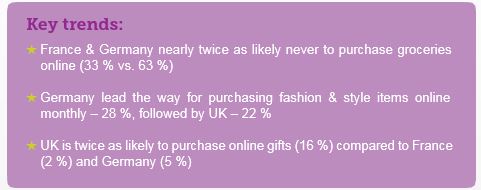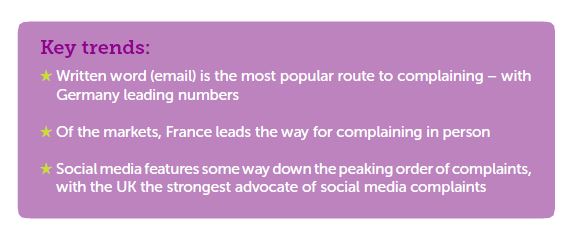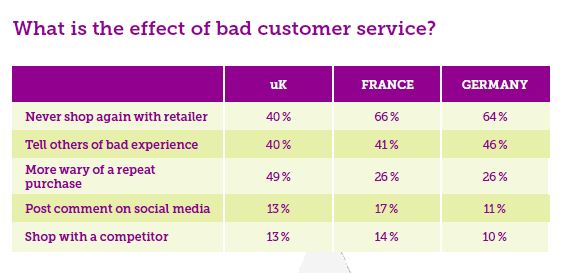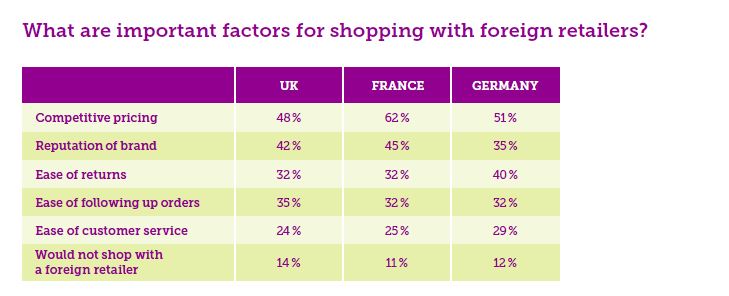Customer complaint management app Youstice recently interviewed 3,000 customers about their online purchasing behaviour. This exclusive survey covered three key European markets — the UK, France and Germany. In each country, 1,000 respondents were questioned about their shopping habits.
The purpose of the survey was to gain fresh insight into the mindframe of modern customers and see how merchants can deal with complaints in a quick, efficient manner while minimizing negative feedback. Another goal was to share valuable data with e-shops so that they could reflect on their current customer care and make improvements where necessary to keep up with the customer of today.
These insights are invaluable advice that you can pass along to your clients, helping them to implement these suggestions for maximum results.
Let’s look at some of the survey's key findings.
You might also like: 3 Strategies for Improving User Experience in Your Ecommerce Designs
1. Brick-and-mortar shops are changing into showrooms
Even when shoppers aren't purchasing online, the trend of comparing prices in person and on mobile phones is definitely on the rise. This so-called "showrooming" trend is the practice of checking merchandise in a physical store, and then purchasing it online — usually at a cheaper price.
More than half of smartphone users (55%) currently use their devices to "showroom." In a recent study by Capgemini, which polled 16,000 digital shoppers, more than half of the respondents said they expected physical stores to become showrooms by 2020.
2. Clothes are very "in" online
The frequency of online purchases is increasing steadily. But where do the shoppers click most often?
More than half (52%) of the respondents said they bought items from online gift, electronic, and entertainment retailers once a month or more regularly. Around 30% reported purchasing goods from online fashion and styling retailers, while almost a quarter said that they used online grocery stores once a month or more often.
Those surveyed indicated that clothes (59%), entertainment products (55%) and electronic items (46%) were the goods that they purchased the most.
3. Germans are very cautious about shopping online
It's not good to hold on to certain stereotypes, but these ones are proved by science. A high percentage of respondents in Germany and France said that they never purchased groceries online — 63% in Germany and France, compared to 33% in the UK.
Additionally, British consumers were found to be twice as likely to purchase online gifts (16%), compared to shoppers in in France (2%) and Germany (5%).

4. Pricing is still a key factor
Competitive pricing remains one of the key drivers of online retail. Our study found that 80% of respondents consider pricing a decisive factor before buying a product or service.
Over half (54%) look at the availability of stock, while more than four out of ten respondents (43%) based their decision to purchase on whether the retailer had an easy return policy.
Brand reputation was very important to respondents across all researched markets. The ability to follow up on an order was a key factor for one third of all those polled. However, German consumers were more concerned about the availability of customer service compared to their counterparts in France and the UK.
5. Good after-sales care matters
When facing the question of which retailers provided the best customer service, over six in ten respondents said that offline sales channels, such as department stores (69%) and independent high street shops (62%), offer the best kind of after-sales care. Additionally, French interviewees rated native online retailer's after-sales care higher (64%) than their counterparts in Germany and the UK.
This is a key psychological insight for online retailers. Good customer experience is extremely important for repeat-purchase behavior. People are most likely to remember two parts of any experience: the end of the experience and the emotional peak of the experience. This means one thing for online retailers: if a customer has a particularly bad service experience, this will be the primary thing they remember about the retailer due to its emotional high intensity and because it will likely be the last experience the customer has with the retailer.
Three quarters of respondents said they found online shopping less appealing due to the fact that they couldn't question or appeal their order. However, 63% said they would purchase an item online if they found positive reviews on the Internet and if there was a clear and easy-to-access customer service selection on the retailer’s website, such as a multichannel claim-handling app or an online chat.
You might also like: Designing With Customer Service In Mind Above All Else
6. Dealing with complaints is your gateway
How do consumers prefer to complain — by phone, email or personal visit? All three markets have strong preference for complaining via email, especially in Germany where 74% said they preferred to complain using written word. On the other hand, French shoppers are most likely to complain in person with 20% compared to 19% in the UK and 15% in Germany.

Another point of interest is how you impact shoppers with bad customer service. UK consumers were found to be more likely to forgive poor service. Around 40% of UK shoppers said they would never shop at a retailer that had delivered bad service, but 66% of French and 64% of German ones would still hold a grudge.

7. Perceptions of native versus foreign online retailers
The last part of our research was aimed at shoppers' views on foreign retailers. Around one fifth of respondents said they would be happy buying from an online foreign retailer if they had a unique product or a great deal. However, 11% indicated they would not shop with an online retailer outside their country of residence under any circumstances.
What are the other factors for shopping at foreign online stores? More than half of those surveyed (53%) said that competitive pricing is what they base their decision on. Around one third of respondents (33%) said they wanted to be able to follow up on faulty items and non-deliveries with foreign retailers. For just over a quarter (26%), the availability of customer service and the ability to submit and order request were important factors.

Can trust or reputation of foreign e-shops help the odds? In the UK, around 41% of respondents said that trust was an important factor when purchasing from foreign online retailers. The figures for France and Germany were 43% and 51% respectively. This supports the premise that cross-border retailers need to close the psychological distance between themselves and their market by providing a unique product with competitive pricing and great customer service.
Foreign retailers seeking more business abroad should also focus on their reputation. Over two thirds of respondents (68%) said that reputation would determine whether they shopped with an overseas online retailer. In fact, over 41% considered reputation the most important decision-making factor.
Conclusion
As you can see, online shopping behaviours vary from market to market — and yet, certain key principles remain the same. Trust, reputation, availability of customer care: all of these seem to close the gap between shoppers and online retailers.
"Empowering customers" seem to be buzzwords in 2015, and online retailers need to be ready if they want to compete in the ever-growing online market. It is essential for retailers who wish to be ahead of the game to adopt this post-Facebook trend of new direct communication with their customers. The goal is simple: turn customer complaints into a key marketing strategy and thus limit negative reviews, strengthening the trust of clients and growing your reputation.
You might also like: The Top UX Elements to Optimize Your Clients’ Product Page Design









